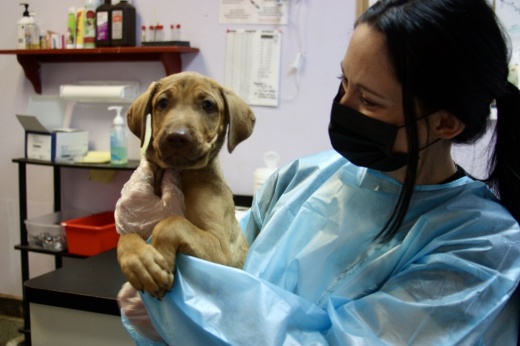During an Oct. 27 New Braunfels Animal Services Advisory Board meeting, members discussed a possible ordinance that would regulate the sale of, and protect the health and welfare of cats and dogs within commercial businesses in New Braunfels.
Allison Scheffel, senior animal welfare and rescue officer for the city, outlined worries that community members have voiced regarding the health of animals at local pet stores.
Residents have shared concerns about animals sourced from commercial breeders and the future potential effects of not regulating the sale of animals, Scheffel said.
A group of residents spoke out against such sales, specifically in regards to the recently opened Puppyland store, during a Sept. 13 city council meeting.
Desiree Supulver, president of the Animal Rescue Foundation based in Seguin, said pet stores should prioritize finding homes for local stray animals rather than selling pets from commercial breeders outside the state.
“Over 2.7 million animals are put down in shelters each year because of overpopulation,” Supulver said. “This will put a strain on city shelters, taxpayer dollars, rescues, vets and the community as a whole.”
Supulver and others in attendance claimed that Puppyland and similar pet stores may put strain on the community if unhealthy dogs are sold or if stores do not offer a return policy.
“Local shelters are already overrun, allowing in a store that doesn't have a return policy, and has no limits on the number of puppies they will put out will only add to an already overwhelming situation,” she said.
On Sept. 27, the Humane Society of the New Braunfels Area reported having 196 animals in the shelter and 250 in foster care. Between Sept. 1-27, 119 cats and 271 dogs were brought to HSNBA, and the HSNBA took in 433 animals in July compared to 426 in July 2020.
Kayla and Justin Kerr, owners of the local Puppyland location, spoke during the advisory board meeting and during a Nov. 8 city council meeting.
“All of our breeders actually exceed our [United States Department of Agriculture] standards,” Kayla Kerr said. “We very much want to show people that our breeders love their dogs and they only want to breed healthy puppies.”
The Kerrs said all dogs sold are checked by veterinarians, 15-day guarantee for covering medical costs if the dog develops an illness, and a two year congenital and hereditary guarantee to give 100% of money back.
“We're here for the life of the puppy if [owners] ever need us. We're extremely transparent with our customers when they purchase a puppy,” said Kayla Kerr. “They go home with the breeder information, the health certificates for the parents. ... They also get that signed off check form from the local vet here.”
During the Oct. 27 meeting the Kerrs said they would be open to an ordinance if it was fair to business owners and the community.
Scheffel presented examples of ordinances in Waco, San Antonio and the state Senate Bill 1818 that failed to pass during the regular session of the Texas Legislature in the spring.
The city of San Antonio in October 2020 approved an ordinance to ban the retail sale of pets within city limits, according to city documents.
Local pet stores are required to work with local shelters and certified rescue organizations instead of large commercial breeding facilities. Independent breeders who sell directly to the public are not affected by the ordinance.
Representatives of the Texas Legislation Network and the Texas Director of the Humane Society of the United States attended the meeting and spoke in favor of instituting a similar ordinance in New Braunfels.
Following the discussion, board members voted unanimously to request that city staff prepare a draft ordinance for their consideration at the next board meeting.
The next meeting is currently scheduled for late January but board members recommended moving the meeting to early December. A date has not been set for the meeting.





